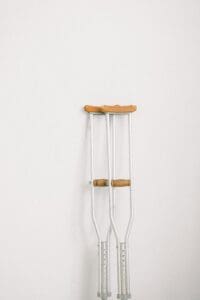Workers’ Comp vs Personal Injury – What’s the Difference?
If you’ve been seriously injured, you may be drowning in medical bills, financially struggling, and unsure where to turn. Everyone seems to have advice, and you hear the words workers’ comp and personal injury thrown around a lot. While both provide compensation after an accident, it is important to understand the differences to determine the best option in your case.
Key Differences Between Workers’ Compensation and Personal Injury Claims
Both workers’ compensation and personal injury claims relate to injury, so you may wonder, what is the difference?
Workers’ Compensation
An injured employee can file a workers’ compensation claim when injured at work or through the scope of their employment. Workers’ compensation aims to protect injured workers first and foremost.
Personal Injury
These lawsuits are appropriate when a third party has injured you. Personal injury claims are your best option if you have suffered an injury that is not work-related (for example, a slip and fall at a store or a car accident).
Unsure which type of claim applies to your case? Contact the workers’ compensation lawyers at Munley Law for a free consultation.
Available Compensation: What You Can Recover
There is some overlap between what damages you can recover in a workers’ compensation claim and a personal injury claim, but there are significant differences.
Workers’ Compensation
Generally, workers’ compensation benefits cover all medical expenses related to workplace injury and a portion of lost wages. These fall under the umbrella of economic damages; workers’ compensation will not cover non-economic damages.
While both claims can address long-term disability benefits, under a workers’ comp claim, the benefits are determined based on set partial or total disability classifications. When long-term disability benefits are awarded in a workers’ comp claim, they are ongoing payments.
Personal Injury
Personal injury claims have a broader compensation range, allowing economic and non-economic damages to be awarded. In addition to medical expenses and lost wages, personal injury claims may cover lost future income, pain and suffering, and other damages.
In a personal injury claim, there isn’t a classification system, and the amount will be negotiated or litigated and included in the subsequent one-time compensation.
Don’t leave money on the table. Schedule a free case review to understand your full compensation rights.
The Right Attorney Makes All the Difference
Some law firms handle both workers’ comp and personal injury cases, but each requires different legal expertise. At Munley Law, we offer both types of specialized attorneys to ensure you receive the strongest possible legal representation.
Workers’ Compensation
Workers’ comp attorneys work within a no-fault system to address denied claims, delayed payments, or disputes about medical treatment and disability categorization.
Personal Injury
Personal injury lawyers must prove fault to maximize your compensation, establish liability, gather evidence, and negotiate with insurance companies from the start. .
Don’t struggle through the process of legal claims alone. Partner with Munley Law’s experienced team to ensure you’re filing the right claims and getting the maximum compensation you’re entitled to.
No Fault vs. Negligence: Workers’ Comp vs Personal Injury
Workers’ Compensation
Workers’ compensation claims are unique from other types of lawsuits because you don’t need to demonstrate that your employer was negligent. This is called a no-fault claim.
Personal Injury
While you aren’t required to show your employer’s gross negligence to receive workers’ compensation benefits, you do need to prove the other party’s negligence in a personal injury lawsuit. To prove negligence in personal injury cases, the injured parties must demonstrate the following:
- The third party owed the victim a duty of care
- The third party breached that duty
- The victim was harmed as a direct result of the breach of duty
Let our experienced attorneys evaluate your case and determine if you have grounds for both types of claims.
Settlement Process and Timeline
Both workers’ compensation claims and personal injury lawsuits can take a while, anywhere from months to over a year. Your attorney will do everything in their power to quickly negotiate a settlement. Get an estimate of your case timeline with a free consultation from Munley Law.
Impact on Employment Status
Under federal and Pennsylvania law, your employer can’t discriminate or retaliate against you for filing a workers’ compensation claim. As an injured worker, you can’t be wrongfully terminated, have your hours reduced, or any other punishment. Concerned about your job security? Let our attorneys protect your employment rights.
Handling Medical Treatment Requirements
Getting medical treatment following a work-related injury is a bit different than other medical care. For example, your employer’s workers’ compensation policy will often control your choice of healthcare providers. When you are injured outside of work, you usually have full freedom to select your healthcare provider.
Workers’ Compensation
Workers’ compensation insurance policies also often require you to go through the pre-authorization processes for medical treatments. If you aren’t familiar with the process, it is essentially asking insurance to approve coverage of a treatment or medication beforehand. These claims required the injured worker to submit numerous detailed state-mandated forms.
Personal Injury
Injured parties have more of a say in who their healthcare providers are. They can make decisions that are based more on physician recommendations than policy guidelines because costs are being negotiated after the fact. In personal injury claims, there are no state-specific forms. Medical records, experts, witnesses, and accident reports are the documentation in a personal injury claim.
Get help understanding your medical treatment rights. Contact our injury attorneys today.
Time Limits and Legal Deadlines
Workers’ Compensation
To receive benefits, you must report your injury to your employer within 120 days. You then have up to three years to file your claim, but filing as soon as possible prevents your employer’s workers’ compensation insurance from arguing your injury isn’t work-related.
Personal Injury
When filing a personal injury lawsuit in Pennsylvania, you have two years from the date of the accident. Don’t risk losing your right to compensation. Reach out to Munley Law before time runs out.
Filing Multiple Claims: What You Need to Know

- If a machine malfunctions in your industrial workplace due to a manufacturing defect and injures you, you may be able to file a personal injury lawsuit against the manufacturer
- If you’re an electrician driving to a client’s home and are hit by another driver, you can pursue a personal injury claim against the at-fault driver.
Filing both claims doesn’t mean you get double compensation. The benefit of filing both is that costs are distributed among the different parties. Workers’ compensation benefits are more likely to cover lost wages and medical expenses, whereas you could use a personal injury claim to cover damages like pain and suffering.
Get expert guidance on maximizing your recovery through multiple claims. Call Munley Law now.
At Munley Law, we proudly serve injured workers throughout Pennsylvania with dedicated legal representation. Whether you need assistance with a workers’ compensation claim, personal injury case, or both, our experienced attorneys are available at our convenient office locations across the state. Visit us in Allentown, Scranton, Wilkes-Barre, Reading, Philadelphia, Pittsburgh, Carbondale, Stroudsburg, or Hazleton to discuss your case. We understand the challenges Pennsylvania workers face after an injury and are committed to fighting for the full compensation you deserve. Contact us today for a free consultation and let our family fight for yours.

Marion Munley
Marion Munley has been practicing personal injury law for nearly 40 years. She is triple board-certified by the National Board of Trial Advocacy for Truck Accident Law, Civil Trial Law, and Civil Practice Advocacy. She currently serves as Vice President of the American Association for Justice, an organization dedicated to safeguarding victims’ rights. Marion has won many multimillion-dollar recoveries for her clients, including one of the largest trucking accident settlements in history. She has been named a Top 10 Super Lawyer in Pennsylvania since 2023, a Best Lawyer in America, and was recently inducted to the Lawdragon Hall of Fame.









